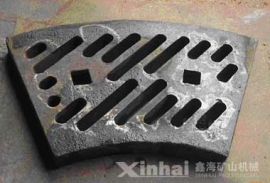Laterite nickel mineral is a clay ore formed by long-term weathering, leaching and deposition of nickel oxide deposits, containing iron, aluminum, silicon and other aqueous oxides. It is divided into limonite layer, transition layer and humus layer according to the distribution of different layers. The smelting process of laterite nickel in different layers is also different. In this paper, we will introduce the treatment method of laterite nickel ore according to the different ore layers.

Use the table of contents below to navigate through the guide:
01Laterite nickel mineral in limonite layer
Limonite layer laterite nickel mineral mainly contain limonite, pytite ore, aluminum ore, chromite, etc., and often contain a certain amount of cobalt. Generally, this type of laterite nickel ore is suitable for wet process treatment. The treatment method is mainly high-pressure acid leaching process, which is suitable for sulfuric acid reaction in the autoclave, and can recover nickel comprehensively, cobalt and other valuable metals. The reaction process is relatively friendly to the environment, and because it is prone to corrosion and scaling in the production process, the autoclave needs regular maintenance.
In addition, the alkaline leaching process is also used in the limonite layer of laterite nickel ore. This method is based on the high concentration of alkali metal or molten sodium hydroxide system, and the carbon decomposition method is used to extract silicon, magnesium, nickel and iron successively, to realize the comprehensive utilization of laterite nickel ore.

02Laterite nickel mineral in transitional layer
This layer of deposit is located between the limonite layer and the humic layer, also known as the clay belt or chlorolonite belt. This layer contains chlorolaronite, silica and a small amount of needle ore, and nickel exists in chlorololonite in different oxides. The treatment process of this kind of laterite nickel ore mainly includes atmospheric pressure acid leaching process, reduction roasting-ammonia leaching process and small blast furnace process.
Atmospheric acid leaching process includes pulp preparation, nickel leaching, nickel precipitation recovery, or purification. This process can realize the enrichment of nickel in laterite nickel ore, and the use of organic acid has less environmental pollution, relatively low loss and cost, and low equipment maintenance cost.
Reduction roasting-ammonia soaking process include laterite nickel drying, reduction roasting, multi-stage reverse current leaching, selective precipitation to obtain carbonate precipitation, and forging to obtain nickel block products. Its process is relatively long, the reagent can be recycled, consumption is small, can effectively recover nickel and cobalt.
Small blast furnace process is to produce medium iron nickel containing 5%~8% in the small blast furnace below 200 cubic meters, and recover two valuable metals of nickel and iron in laterite nickel ore. The product can be used as the primary raw material of stainless steel.

03Laterite nickel mineral in humus layer
This layer of minerals is deeper, mainly including silicon and magnesium nickel ore, quartz, talc, serpentine, olivine and other minerals. This layer contains high nickel, but the chemical composition and mineral components are not uniform. This kind of nickel ore mainly adopts reduction roasting-magnetic separation process, rotary kiln pre-reduction-electric furnace smelting process, reduction roasting-acid leaching process, hydrothermal process for recovery.
Reduction roasting-magnetic separation process mainly includes two stages: reduction of iron nickel oxide and growth of iron nickel particles. This process uses the reduction process to promote the growth of metal particles and improve the fine and uneven distribution of nickel-containing minerals. Generally, powdered coal is used as a reducing agent to enrich nickel and iron in laterite nickel ore. The reduction of laterite nickel ore to metallic iron and nickel at temperatures below the melting point of the ore enables the efficient separation of nickel iron alloy.
Pre-reduction smelting process of rotary kiln-electric furnace mainly includes drying, calcination, pre-reduction and smelting processes. Laterite nickel ore contains a large amount of free water and combined water, which needs to be removed by means of drying and calcination. In high temperature environment, the nickel ore is reduced by reducing gas, and high nickel recovery rate can be obtained after smelting process. This process is suitable for treating laterite nickel ore with high nickel grade, but cobalt cannot be recovered.

Reduction roasting-acid leaching process is performed at room temperature to reduce the dissolution of iron. Nickel and cobalt enter the solution under acidic conditions, with high leaching rate and good selectivity, which are suitable for laterite nickel ore in humic ore with high nickel and cobalt content.
Hydrothermal process is also known as hydrothermal method. In the closed pressure vessel, water is used under high temperature and high pressure as a solvent. According to the different reaction types, it can be divided into hydrothermal oxidation, hydrothermal reduction, hydrothermal precipitation, hydrothermal synthesis, hydrothermal hydrolysis, hydrothermal crystallization, etc. Among them, hydrothermal crystallization is more common and can be used to treat humus type laterite nickel ore.
The above is treatment process of laterite nickel mineral in different layers. In actual production, the property of raw ore will be changed with mining boundaries. Xinhai suggests that customers should consider actual condition. Before building the concentrator, customers should make the nickel mineral processing plan scientifically and reasonably through the methods of beneficiation test and design to get the ideal economic benefit.


 marketing@ytxinhai.com
marketing@ytxinhai.com  0086 13810327080
0086 13810327080 






































































































 CHAT
CHAT MESSAGE
MESSAGE





